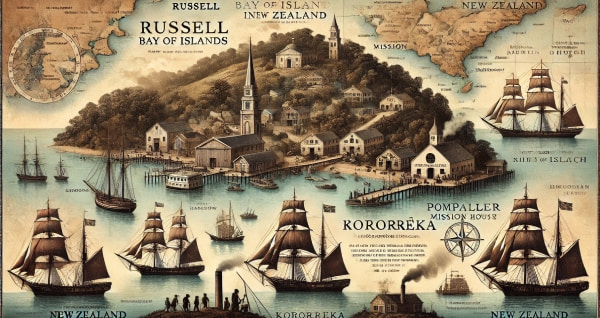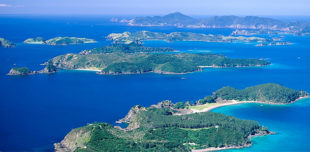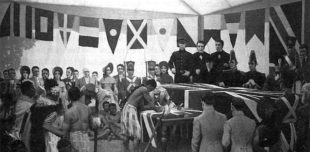A Hell Hole

By the early 1800s, Kororāreka had firmly established itself on the map. News of its excellent deep-water harbour, described by Captain Cook as a "most noble anchorage," had spread far and wide. This attracted a growing number of foreign vessels, particularly British and American whaling ships, which stopped by for repairs, supplies, and shore leave.
Whaling evolved into a significant industry and remained so for the next century. Throughout the town, various artefacts from this era can still be found, with many preserved in the local museum. At Whangamumu Harbour, you can explore the remains of an old whaling station, which is accessible via the scenic Whangamumu walking track.
The local Māori were highly entrepreneurial, engaging in active trade with the newcomers. They supplied fish, pork, kumara, flax, greens, fresh water, and even engaged in a less savory trade—women. When ships arrived in port and their crews took shore leave, grogshops and brothels thrived with business. The waterfront was often chaotic, rowdy, and prone to violence, earning Kororāreka the infamous nickname "Hellhole of the Pacific."
The significance of trade to the Māori is exemplified by the "Girls' War" of 1830. This conflict began as a quarrel between two Māori women from different tribal groups, both favored by a whaling captain. The argument quickly escalated, leading to a battle on Kororāreka's beachfront involving large groups from both tribes, resulting in significant loss of life. Ultimately, the dispute was less about the women themselves and more about one group's attempt to dominate trade with visiting ships.
But not all was entirely hellish in the town. The missionaries were busy: the Church Missionary Society built the Anglican Christ Church (still standing today) in 1835-36 while their rival Bishop Pompallier and the Marist Brothers from France arrived in 1839 and built their mission and printery on the south end of the beach in 1841. Both of these important historic sites are open to visitors today and well worth a visit in Russell, Bay of Islands.
An evil trade. One catastrophic consequence of trade with Europeans came from Māori acquiring muskets. The result was The Musket Wars, and during the 1820's old feuds between tribes were settled with the powerful new weapons. The northern tribes especially were quick to take advantage of them and set out on raids of utu (revenge) as well as simple plunder; the bloody slaughter was immense with some tribes being decimated and old tribal boundaries altered.


